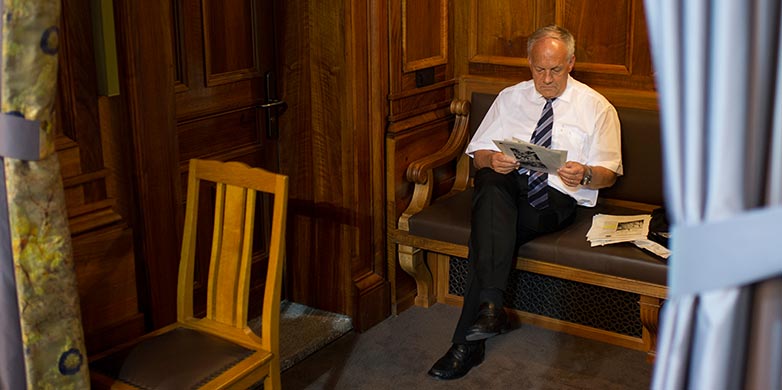Pointing the way for researchers in Switzerland
The federal administration will finance the researchers in Switzerland who wish to participate in Horizon 2020 in 2014. The declared objective continues to be a quick association with the European research and innovation programme.
The Federal Council has pointed the way: researchers in Switzerland wishing to participate in the Horizon 2020 European research and innovation programme will be funded directly by Switzerland. This was decided by the federal government on Wednesday: “We have found a solution for 2014,” Federal Councillor Johann Schneider-Ammann told the media. “This solution creates certainty and clarity for our research community, because we provide the funds that authorise participation in Horizon 2020.”
The Federal Councillor emphasised that the declared aim continues to be a quick and full association of Switzerland in the European programme, which has a budget of some EUR 80 billion: “We are in permanent contact with Brussels so that Switzerland can, at the very least, achieve partial association.”
Since February of this year, when the Swiss electorate voted for quotas on immigration, Switzerland has been deemed to be a third-party state and no longer an associated country for Horizon 2020 and Erasmus+. Although projects with a Swiss involvement (with some exceptions) can be submitted to Horizon 2020, researchers from Switzerland will not receive any funding from the EU due to the third-party country status.
CHF 500 million for 2014
The Swiss participations will now be funded by the federal government. This will come from the CHF 4.4 billion that parliament approved for Horizon 2020 in autumn 2013. As Switzerland is not associated, it currently does not transfer any funds to the European Commission. The CHF 500 million earmarked for 2014 is instead available for direct payments to researchers in Switzerland, said Johann Schneider-Ammann.
The direct funding will initially affect the Horizon 2020 tenders in 2014. If the association is delayed further, the Federal Council will again decide on interim measures. Gregor Haefliger of the State Secretariat for Education, Research and Innovation added that it is important for the involvement of Swiss researchers in syndicated groups in joint research projects that the funding of the Swiss involvements is secured.
Funding certainty for projects
For researchers at ETH Zurich, this means that the direct funding from the federal administration will encompass all project submissions for cooperation projects under Horizon 2020 planned for this year, including the costs for managing or coordinating cooperation projects.
With third-party country status ETH researchers are entitled to participate in and coordinate projects if Switzerland guarantees the funding. In the seventh research framework programme, with which Switzerland is associated, ETH Zurich was involved in some 550 research projects between 2007 and 2013, in 27 of them as a leading institution in the role of the project coordinator.
The federal association will also fund projects of the European Institute of Innovation & Technology (EIT) and external page ERA-NET research coordination, in which ETH Zurich is involved to a lesser degree. This would also mean, as a basic rule, that the federal administration will cover the direct funding for any new project submissions from initiatives such as Climate-KIC.
The State Secretariat for Education, Research and Innovation (external page SERI) is responsible for the direct funding: the SBFI will make the application forms for project-by-project funding available on its website in autumn 2014. The contribution criteria are guided by those of Horizon 2020 as much as possible. The processing will be similar to that of the years from 1992 to 2004, when Switzerland was not associated in the research framework programmes.
The federal administration will also cover the funding for research programmes and initiatives this year that would be co-financed in the event of an association in Horizon 2020 for Swiss researchers: they include, in particular, the external page COST actions, which support researchers, amongst other things, in establishing an international network.
ERC grants: SNSF to provide further support
However, portions of the individual fellowships within the framework of the Marie Skłodowska-Curie actions, which support the international mobility and career development of young researchers, are not part of the interim measures for 2014.
That leaves the prestigious grants of the European Research Council (external page ERC): ERC grants were introduced in 2007 and have established themselves as the currency and a seal of quality for top research. However, only researchers from member states of the EU and associated countries may apply for ERC grants. This exclusion hits ETH Zurich hard; after all, its researchers had a high success rate of some 30 per cent for the Starting Grants, Consolidator Grants and Advanced Grants.
The Federal Council now wants to continue the external page Temporary Backup Schemes of the Swiss National Science Foundation (SNSF) in order to maintain as much as possible the international competitiveness of Switzerland as a place to do research and drive innovation: to this end, it has requested the parliament to approve additional funds
In spring 2014 the National Science Foundation launched the SNSF Starting Grants and the SNSF Consolidator Grants: they roughly correspond to the ERC grants in terms of objectives and terms. A replacement for the Advanced Grants would be the next item on the agenda.
Erasmus+: solutions decided already
For Erasmus+, the Federal Council decided on an external page interim solution for 2014 on 16 April. It specifies that Switzerland pays the stays abroad of its own and its foreign students. Johann Schneider-Amman told the National Council in mid-June that the Federal Council must ensure “continuity in the Erasmus+ matter for 2015 and probably also for the years thereafter” in the second half of the year.
Ralph Eichler: “The minimum objective is ERC appraisal”

“I welcome the fact that the Federal Council is supporting our researchers with interim measures, because the unclear situation for students, researchers and employees is my main concern,” said ETH President Ralph Eichler. However, he stressed that the interim measures are not the best solution for ETH and for research in Switzerland in the long term.
“In particular the exclusion from the ERC funding schemes will have a negative impact on Zurich as a place to do research in the long run, because our researchers will lack a Europe-wide comparison with other excellent researchers. The priority is therefore for Switzerland to associate with Erasmus+ and Horizon 2020 as soon as possible or, as the minimum objective, to at least achieve appraisal of the Swiss project applications by the ERC.”
